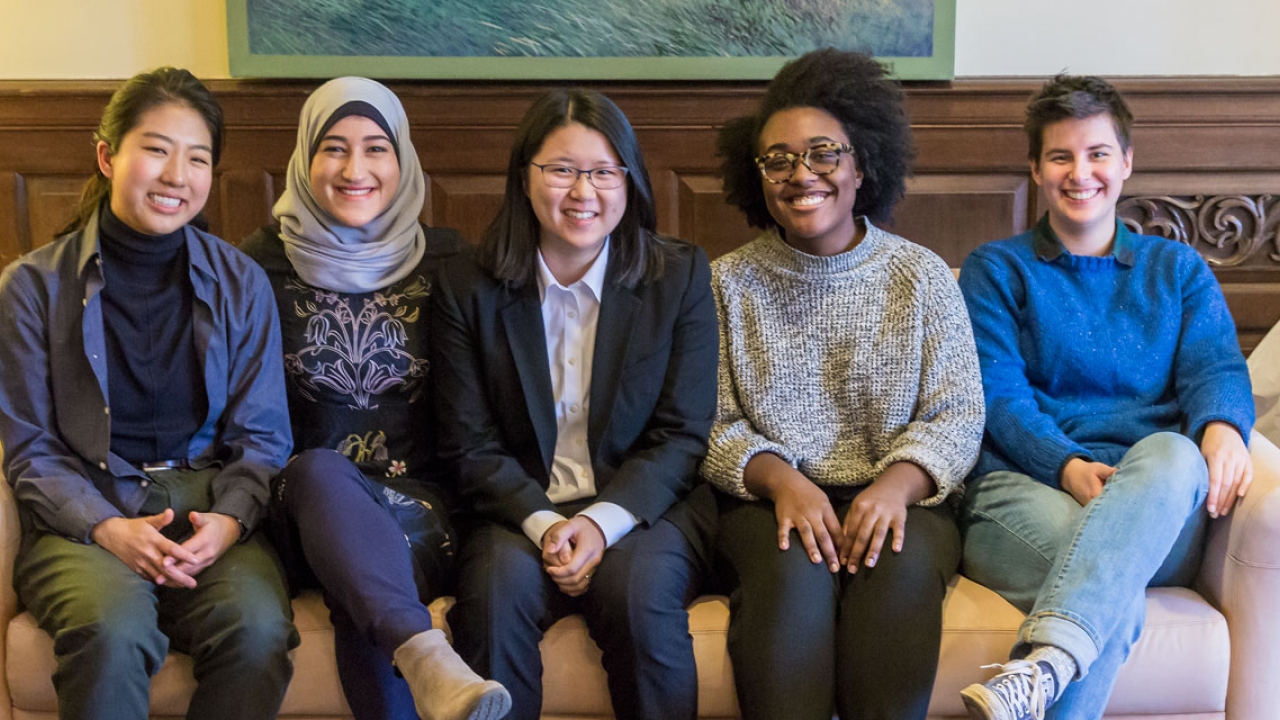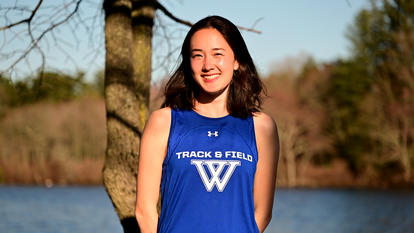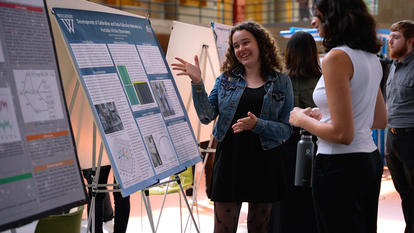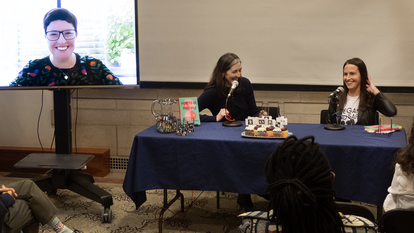Five Seniors Receive Daniels Fellowships to Pursue Dream Projects

Five Wellesley seniors have been awarded Pamela Daniels ’59 Fellowships, which will support their completion of an original project that they will present at the Ruhlman Conference in April 2018. Awarded each fall by the Office of the Provost and Dean of the College, the fellowships were endowed by Dean Daniels’ former students, classmates, and friends upon her 2000 retirement as class dean. The fellowship is intended to encourage seniors to envision and carry out a “dream project”—work they would love to do before graduating—and to embrace bold thinking and intellectual or artistic risk-taking.
“Intellect is released and curiosity whetted when we entertain a question, imagine a project, and pursue an idea that taps into our identity—engaging who we are as well as what we know,” said Daniels in a recent interview. “These fellows and their senior dream projects are a gift and an inspiration to the College as well as to the generations of alumnae whose generosity has made the fellowship possible.”
This year’s fellows recently met each other—and Daniels—at a celebratory luncheon. Here are their descriptions of the projects they will pursue:
Nisreen Abo-Sido ’18, environmental studies major
Project title: Analysis of the Nutrient Composition, Efficacy, and Sustainability of Bokashi Fertilizers
Through interdisciplinary coursework at Wellesley and internships abroad, I have developed tremendous admiration for the innovative agricultural techniques that small farmers around the globe have developed. A traditional agroecological technique of particular interest to me is bokashi, a fertilizer of fermented manure and other organic waste products that was developed in Asia and adapted to resources in other parts of the world, like Latin America. I became fascinated by this technique and wondered why it is not discussed in scientific journals and broader conversations of sustainable agriculture. To bridge the gap between native or local knowledge and reviewed scientific research, I will analyze the biochemical properties of bokashi from start to maturation—using different initial ingredients—and I will assess the possible implications on sustainable agriculture and food sovereignty. As a Daniels Fellow, I am pursuing my scientific curiosity and forming meaningful partnerships with local farms to exchange resources, like manure, and insight about farming techniques. My hope is that through these partnerships, I can maintain a research focus relevant to farmers, and ultimately, produce an infographic and potentially host workshops to share the production and utilization of bokashi as a sustainable and productive agricultural technique.
Hans Han ’18, economics major, anthropology minor, with a focus on cities and urban transportation
Project title: A Map of Exquisite Meanings: Urban Transportation as a Language of Spatial Equity and Layered History
My project focuses on my deep interest in people’s patterns of movement within cities, and looks specifically at how Boston’s urban transportation systems have become the physical manifestation of the city’s attempts to heal spatial inequalities between different marginalized groups over the years. I am also looking at how Boston’s transit systems have impacted the broader psyche of the city, creating a layer of cultural and social meanings that are attached to the transportation stops and lines. By analyzing published works, photographic essays, and digital maps, I hope to move away from the idea of a city as just a concentrated human dwelling on a defined landscape—but rather the act of movement itself. Ultimately, this project will show how transportation can smooth out the frictions of people’s daily lives so they can achieve more beautiful and exquisite things with their time.
Receiving the Daniels Fellowships is similar to someone tapping you on the shoulder and saying, “I’ve seen the value of the questions that drive your work. Take the important risks, and you’ll be following a long legacy of others who did the same.”
Diana Lobontiu ’18, theater studies and psychology double major
Project: Writing a one-woman play about fame, religion, and queerness
I am a Romanian immigrant, and between the ages of 8 and 10, my faith in God was intense. However, as I grew older, I started to question the religion I had been ensconced in.
I am exploring the themes of religion, fame, and queerness by writing and performing a solo show about a girl’s efforts to become a saint in the Russian Orthodox Church. Set in a 17th-century monastery in Varzaresti, a Romanian village, the show follows the story of Teodora, who is more concerned with celebrity than with holiness, and sees saintliness as her “big break.” Teodora wants to perform miracles for adoring disciples, and she will stop at nothing to accomplish her goal. Her path is blocked by a budding romance with Iosefina, a fellow novitiate who lives at the monastery and tends the sheep. The show will be presented in English and some Romanian, and I hope to perform it in the Wellesley Chapel.
I want to use this project as a lens to examine the intersections between faith, love, and the secular need to be recognized. I also hope to increase the visibility of queer foreign people by putting their stories on a stage. Winning the Daniels Fellowship means a great deal, as I am being recognized not only as an exceptional student but as an artist.
Jordan Mayfield, art history major
Project: Researching the portrayal of Black female deities from Afro-Atlantic religions
I originally started working on this subject while taking a seminar on race and gender in contemporary art during my sophomore year. I was fascinated by the work of Renee Stout and her incorporation of Haitian Vodou and West/Central African sculpture in her art-making practice. From this study I learned about the work of Maria Magdalena Campos-Pons as well. The deities that these two artists depict in their work represent extremely feminist ideals and personify Black womanhood. I felt that this study of Vodou feminism and aesthetics was lacking in contemporary art history, so I was eager to use my research to fill in this void in the canon.
It’s so wonderful to know that Wellesley understands and appreciates my academic, but highly personal, research project. Growing up in Black American communities, you’re often told that Vodou is taboo and not a real religion. However, I want to highlight the historical significance of Vodou in Black art communities and help to shed the stigma surrounding the belief system. Winning the Daniels Fellowship helped to affirm the importance of my scholarship.
Annie Schnitzer, German studies major
Project title: The Power of Art to Break Despair: The Cultural Impact of the Kohleausstieg on Two Communities in Former East Germany
My project comes from the work I did this past summer in Berlin, Germany, where I interned with an environmental engineering group and learned about the Kohleausstieg (coal-exit), a German policy of phasing out dependence on coal use and turning toward more sustainable energy sources. This transition represents more than a loss of economic livelihood, which is traumatic; it also means the disappearance from peoples’ lives of much that was familiar, certain, and secure.
I saw firsthand some of the real problems individuals and communities must confront and overcome in trying to move forward. I also saw the creative ways people addressed those painful challenges, using art for self-expression and as a way to communicate the lessons they learned. My research will examine how these former coal mining communities have dealt with the daunting change in their lives and the cultural, social, and psychological effects.
I am honored and humbled to be named a Daniels Fellow. It enables me to conduct important parts of my research that I would otherwise be unable to do.
Pictured, from left to right: Hans Han, Nisreen Abo-Sido, Annie Schnitzer, Jordan Mayfield, and Diana Lobontiu.



